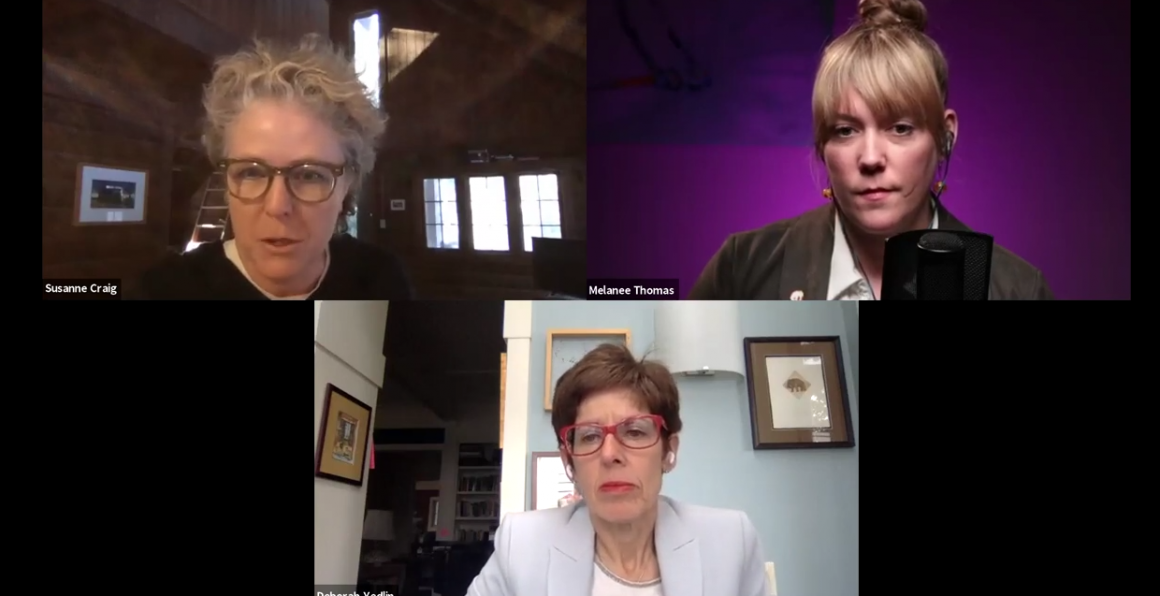
Webinar: Media, politics, and society in a post-truth era
By Sophia Lopez, March 9 2021—
On March 2, a webinar discussing media, politics and how common it has become to dismiss diverse information that favours existing beliefs, took place over Zoom.
Hosted by the 14th chancellor of the University of Calgary Deborah Yedlin, the webinar invited investigative reporter of The New York Times and UCalgary alumna Susanne Craig, and associate professor and graduate program director of the department of political science Dr. Melanee Thomas, to discuss some recurring issues regarding the media and how it has affected the way people receive politics.
Yedlin explained how people are now more integrated in politics because of the media, but are also able to easily — intentionally or unintentionally — participate in confirmation bias to tune in to sources that confirm our beliefs and quickly turn away from sources that challenge or oppose our values.
Craig, who works at one of the most well-known newspapers in the world and had previously been a reporter for the Gauntlet, provided her insight on the topic of media influence considering how newspapers are no longer the only source that provides information on topics that concern the public.
The first issue discussed was how the media has allowed for political systems to become more polarized due to the tendency for people to give in to confirmation bias, and how this disconnected community of people begins to gain an overall distrust in the government.
“Whether or not you agree with how much government there should be, I think that right or left there becomes a distrust in basic institutions which is another really dangerous thing that I think is going on in the US,” explained Craig.
Thomas’s research focusses on what causes gender-based political inequalities and its outcomes. With her knowledge on the subject, she is able to provide a quality perspective on the political issues occuring in the media, such as misinformation distributed by people in power.
Following Craig, Thomas explains how this polarization occurring politically and within the media can draw in perceived status threat, which is, as she puts it, “when people start to react with sometimes extreme reactions, including violence to groups that they think are a threat to their privileged position or privileged hierarchy or the way that they would prefer things to be politically.”
When asked by Yedlin how much of a responsibility is it for people to look at sources or channels displaying different perspectives on politics, Craig was quick to respond by saying that “it is your responsibility, but it’s not that simple.”
She explains how it is easy for us to change the channels we view and to look at various sources, but we also are at risk of being exposed to information that isn’t entirely accurate — also known as fake news — which can oftentimes be hard to point out.
Thomas adds on to Craig’s response by saying how people can’t possibly be able to sort out all the fake news from the factual, accurate news.
“People do not have the time to do really nuanced sorting of information on a daily basis,” she said.
Craig’s five-year dedication to reporting on the former US president’s finances and taxes has definitely helped her to acknowledge how the media, although in some cases not always reliable, has allowed her work and other important information to be received more widely by people.
Although she believes that the US has had to hold elected officials accountable more often than in Canada, Thomas provides a more Canadian perspective on this use of media as a tool for involving people in politics.
“If we look at the Canadian based stuff we think, ‘Oh we don’t have this here,’ but then forget that all of us consume all of the stuff in the United States anyways,” she said.
Yedlin read out a question by an audience member which asked if the guests had any thoughts on the possible legal measures against fake news. Thomas believes that implementing proactive disclosure — getting people to disclose where they work — could potentially alleviate the issue. Although she thinks it would be great to see it happen, Craig doesn’t see any legal measures against fake news being installed just yet.
“It’s a really hard issue, I just think that in the fast-moving world that we live in I think that sort of stuff isn’t going to be happening,” she explained.
Regardless of the webinar’s focus on the influence the media has on politics, it is crucial to recognize the importance of newspapers in providing accurate information on topics that concern the public.
“If you don’t have the information, you can’t use it to hold somebody accountable,” said Thomas.
Craig touched on how important it is to continue valuing the hard work being done by newspapers to provide accurate information to the public, whether it be through actual print copies or subscriptions.
“I think 60 or 75 per cent of our revenue is now subscriber based and not ad based,” she explained. “I can’t underscore how important it is to pay for that content because you’re paying for all this work that’s done.”
Thomas also adds how our society is so accustomed to paying for other online services with no hesitation, but we often think twice before subscribing to quality news content.
Overall, the webinar provided an in-depth understanding of the role the media plays within politics, as well as provided the insight of three women, highly knowledgeable of the journalism world and how media can affect the way individuals receive information.
To watch the recorded webinar, visit the UCalagry YouTube channel. For information on upcoming webinars discussing a variety of topics, visit or subscribe to the UCalgary Community page.
